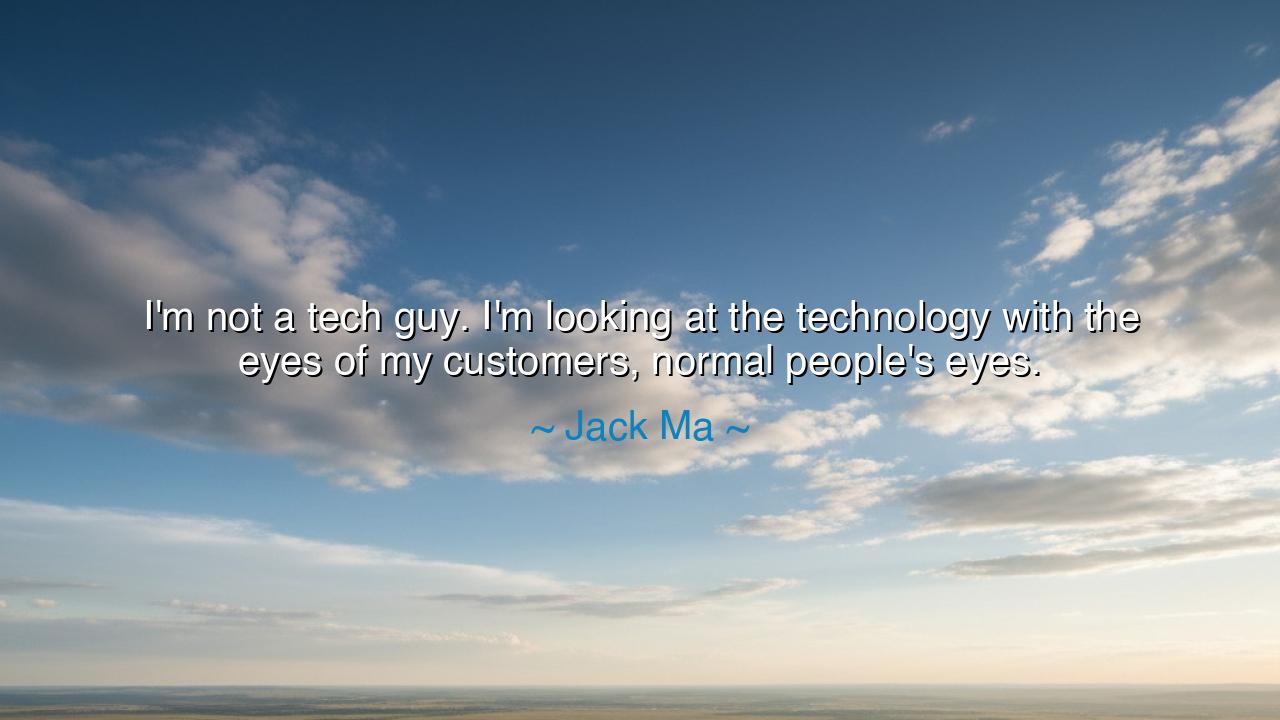
I'm not a tech guy. I'm looking at the technology with the eyes
I'm not a tech guy. I'm looking at the technology with the eyes of my customers, normal people's eyes.






The words of Jack Ma—“I’m not a tech guy. I’m looking at the technology with the eyes of my customers, normal people’s eyes”—speak with humility and profound wisdom. For he reminds us that the highest purpose of technology is not to dazzle the few with its complexity, but to serve the many in their daily lives. The true measure of innovation is not how advanced it appears to engineers, but how useful and accessible it becomes to the common soul. In these words, Ma strips away pride and speaks as a servant, one who seeks to see through the eyes of normal people, the very ones whom technology must uplift.
The origin of this insight lies in Ma’s own journey. He was not born into the world of machines and code; he was a teacher, a dreamer, a man of words before he became a man of commerce. He did not begin as a master of programming, but as one who struggled to understand the vast new realm of the Internet. And yet, it was precisely this distance from the technical that gave him his strength: he saw technology not as a playground for experts, but as a bridge for ordinary people. Thus, Alibaba was born not as a shrine for engineers, but as a marketplace for merchants and buyers—rooted in human need rather than technical pride.
Consider the story of Henry Ford, who, like Ma, was not the most sophisticated engineer of his time. Ford did not invent the automobile; many before him had done so. What set him apart was that he looked upon the machine not with the eyes of its creators, but with the eyes of the people. He asked: how can the common worker, the farmer, the shopkeeper afford this wonder? And with patience, vision, and boldness, he gave the world the Model T. Ford and Ma alike understood the same truth: to see through the eyes of the people is to harness technology’s true power.
Technology, then, is not an idol to be worshiped for its cleverness, but a tool to be shaped for the service of humanity. When it is built only for experts, it becomes a tower that few may climb. But when it is built for the many, it becomes a road that all may walk. The Internet, in its essence, is not lines of code—it is connection. The smartphone is not circuits and glass—it is communication, family, work, and dreams held in a single hand. Those who forget this fall into arrogance; those who remember it, as Ma counsels, build lasting empires.
Yet Ma’s words carry also a warning. If leaders of technology do not humble themselves to look with the eyes of their customers, they risk creating wonders that no one understands or needs. History is littered with inventions that dazzled but did not serve, that promised greatness but failed because they did not answer to the heartbeat of human life. To see with normal people’s eyes is to anchor progress in reality, to ensure that the marvels of science do not outpace the needs of the soul.
The lesson for us is clear: whether we are creators, leaders, or dreamers, we must not lose sight of the people we serve. True greatness lies not in complexity but in clarity, not in boasting of knowledge but in using it to ease burdens and open doors. To see with the eyes of others is to walk the path of empathy, the path of wisdom, the path that leads to works that endure.
In practice, this means: when building, ask not only, is this possible? but also, is this helpful? When speaking, ask not only, is this clever? but also, is this clear? When creating, ask not only, does this impress me? but also, does this serve others? By looking through the eyes of normal people, we guard against arrogance and align ourselves with the true purpose of human creativity.
So let Jack Ma’s words stand as a beacon: technology is nothing without people, and leadership is nothing without humility. To look with the eyes of others is to build bridges instead of walls, tools instead of idols, futures instead of fleeting illusions. May all who create, in any field, learn to see as he did: not from the lofty seat of the expert, but from the humble eyes of those who live, labor, and dream. For in serving them, we serve humanity itself.






AAdministratorAdministrator
Welcome, honored guests. Please leave a comment, we will respond soon